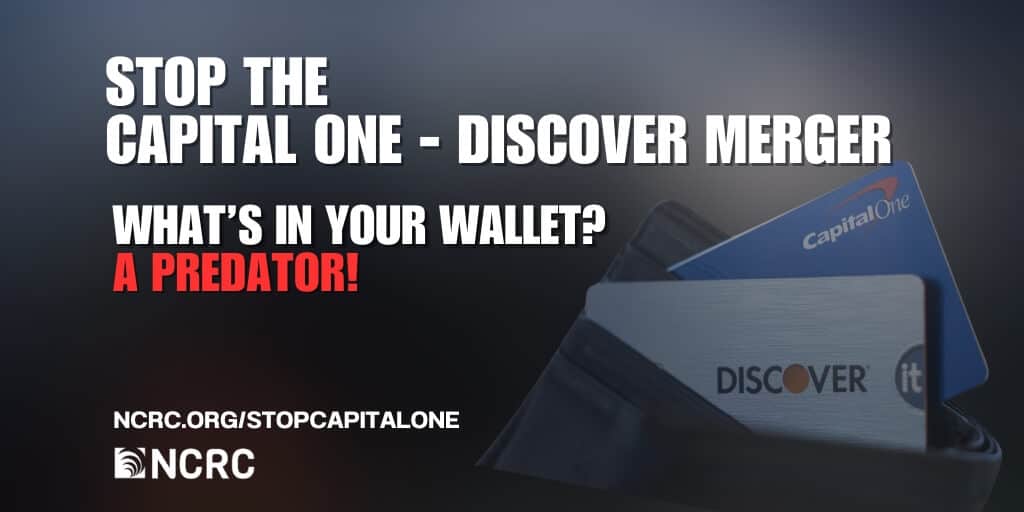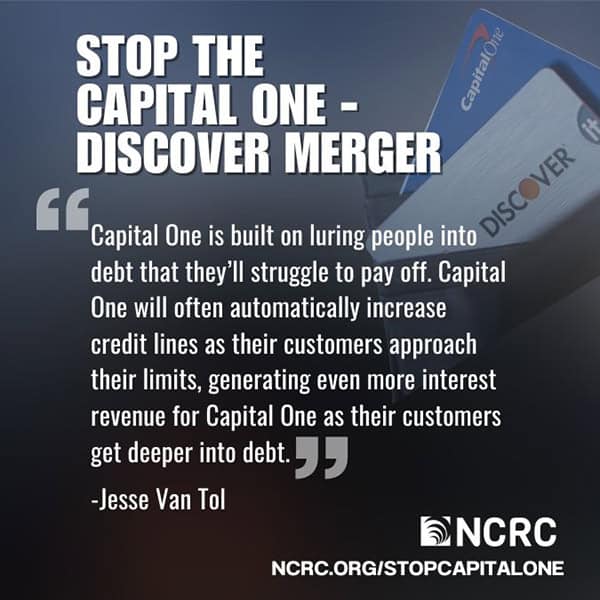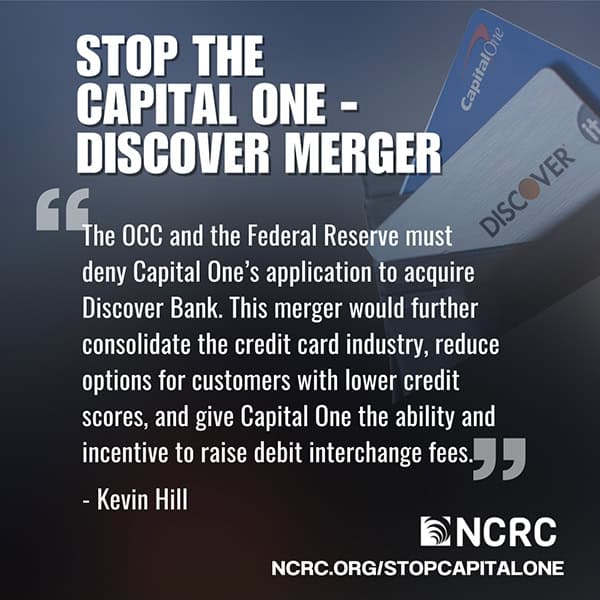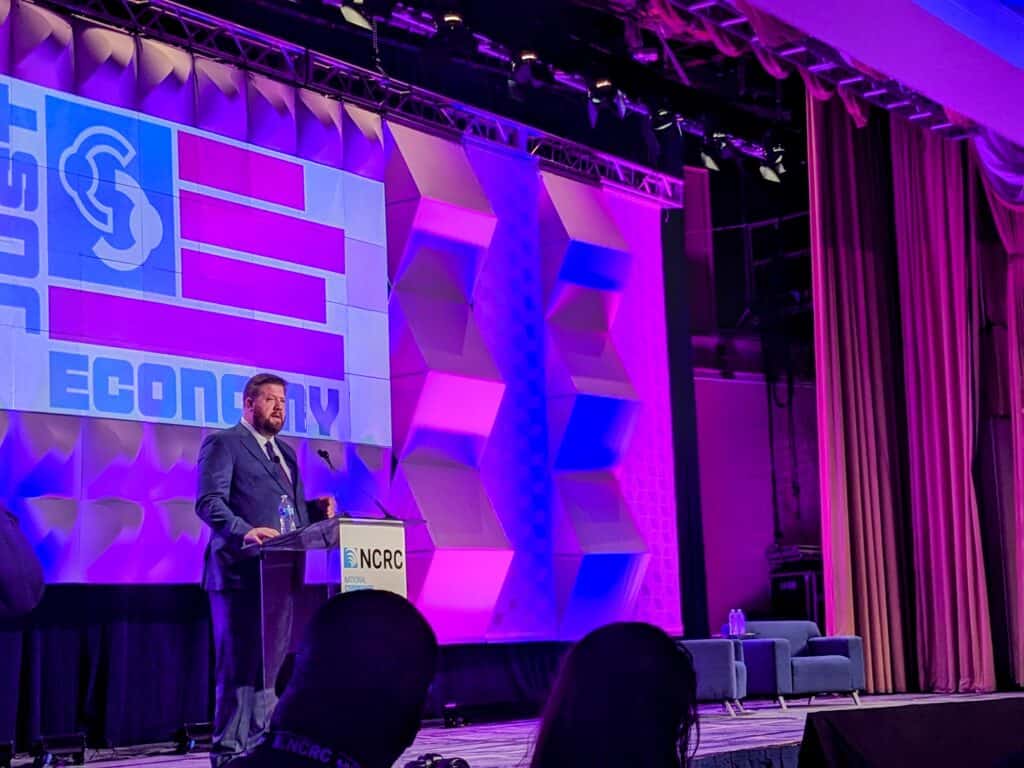Stop the Capital One - Discover Merger
Stop the Capital One - Discover Merger
A predator!
Keep Up
alerts by email.
Capital One’s proposed merger with Discover would be a disaster for low- and moderate-income communities.
Regulators should stop it.
The reality behind Capital One’s shiny marketing is ugly: They carefully identify vulnerable people who are likely to get trapped in debt, then offer them credit cards to harvest interest payments on balances that the cardholders are less likely to fully pay off.
Capital One hunts for their profits in the same streets and neighborhoods where NCRC members work to reverse the wealth-denying consequences of decades of discrimination and disinvestment.
The Capital One-Discover deal also poses serious threats to competitive markets, increases systemic risk across the economy and rewards a bank with a long track record of broken promises and serious misconduct.
That’s why it’s crucial to block this bad merger. The arguments against the deal are simple, straightforward and numerous.
Contact Us
For more information on how to stop the Capital One-Discover merger.
What to know
Here is what you need to know, and what you can do to speak out and stop this merger:
Capital One is a bad actor with a track record of corporate misconduct that should be
disqualifying for this merger application.
disqualifying for this merger application.
Capital One’s conduct has led to multiple enforcement actions for violating consumers’ rights. It was fined $390 million for “willfully and negligently” flouting anti-money laundering laws in 2021. These issues suggest the firm cannot be trusted to behave ethically or lawfully even at its current size.
- Capital One has a habit of targeting its lowest-income customers with tricks that lure them deeper into debt. Capital One for years extended credit limit increases to borrowers who had not asked for them as a way of increasing its interest and fee revenue.
- Capital One is accused of exploiting low-income customers to mislead regulators by ‘juking the stats’ in Community Reinvestment Act exams. Banks sometimes count credit limit hikes as new CRA-eligible loans. Capital One maintained a program to exploit this trick by automatically increasing credit limits for borrowers it identified as most likely to carry a balance or incur late fees, as described by a former employee in the book “Delinquent.”
- In previous successful mergers, Capital One has gone back on public benefit commitments that it used to win regulatory approval. After acquiring ING Direct in 2012, Capital One shuttered bank branches and went back on a promise to use the merger to expand access to mortgage lending. With Capital One’s focus on auto and credit card lending to subprime borrowers, the ING deal ended up hurting homeownership efforts.
The reality of Capital One’s role in supporting community reinvestment is much darker than it looks on paper.
Capital One’s conduct has led to multiple enforcement actions for violating consumers’ rights. It was fined $390 million for “willfully and negligently” flouting anti-money laundering laws in 2021. These issues indicate the firm cannot be trusted to behave ethically or lawfully even at its current size.
- Capital One has a habit of targeting its lowest-income customers with tricks that lure them deeper into debt. Capital One for years extended credit limit increases to borrowers who had not asked for them as a way of increasing its interest and fee revenue.
- Capital One is accused of exploiting low-income customers to mislead regulators by ‘juking the stats’ in Community Reinvestment Act exams. Banks sometimes count credit limit hikes as new CRA-eligible loans. Capital One maintained a program to exploit this trick by automatically increasing credit limits for borrowers it identified as most likely to carry a balance or incur late fees, as described by a former employee in the book “Delinquent.”
- In previous successful mergers, Capital One has gone back on public benefit commitments that it used to win regulatory approval. After acquiring ING Direct in 2012, Capital One shuttered bank branches and went back on a promise to use the merger to expand access to mortgage lending. With Capital One’s focus on auto and credit card lending to subprime borrowers, the ING deal ended up hurting homeownership efforts.
Capital One would almost certainly charge customers more if allowed to absorb the fourth-largest credit card network in the country.
Officially, Capital One is rated “Outstanding” on its recent CRA exams. In practice, that rating is inflated because Capital One has a very limited branch network while engaging in lending activity nationwide. If its CRA activities were evaluated under the new CRA rule – across its business footprint instead of its barely-there branch network area – it could receive a lower grade.
This merger could create another too-big-to-fail bank, posing new systemic risk.
The larger a credit card company’s market share, the higher its interest rates and fees, according to recent data released by the Consumer Financial Protection Bureau (CFPB).
Capital One’s significant role in a lawsuit to block Community Reinvestment Act (CRA) regulations signals it would seek to escape its obligations to marginalized communities if allowed to buy Discover.
Capital One was reportedly one of the loudest voices in favor of suing the banking regulators to undermine CRA enforcement, which its lobbyists did in early February 2024. Working to thwart efforts at promoting lending and financial services access in formerly redlined communities is not a good indicator for how Capital One would wield new market power if allowed to buy Discover.
Arguments that the merger would be pro-competitive are false and misleading.
The merged firm would surpass all others in dollar volume of credit card loans issued – creating a significant risk that an economic shock that hit credit card payment flows hard enough could lead to a taxpayer bailout of the firm.
Capital One’s attempt to buy Discover offers regulators a chance to promote competition by cracking down on bad mergers.
Discover cards are already accepted by 99% of merchants. Its payment network market share is so miniscule that Capital One would have to shift a titanic proportion of its cardholders to Discover in order to meaningfully change market shares – and its own projections would reduce Visa and Mastercard’s dominant share by less than one third of one percentage point. And on the card issuance side of the business, the CFPB has proven that the larger a credit card company gets, the higher the price it charges its cardholders. Competition is supposed to drive down prices. A Capital One-Discover merger would likely drive them up.









